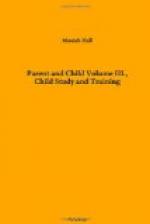The repetition alone is not so important as the intelligent improvement of the act through practice until a satisfactory degree of skill is obtained. After the desired end is reached, attention to the process will cease, but thereafter whenever the right stimulus is presented the act will be repeated, and this will be done with much less effort than was first employed; further repetitions of the act require less and less conscious effort until at length it will be performed almost with the same sureness and ease with which reflex or automatic movements take place. Any activity whatsoever when reduced to this automatic stage is termed habit.
The importance of habit in the development of the child can scarcely be over-estimated; in truth, it is the one great process which dominates nine-tenths of all the activity of the individual throughout his entire life. Habits ought to be our most helpful and reliable servants, but they are too often enemies that bind us hand and foot and prevent the realization of our highest possibilities.
Much of the training and education of the child consists, therefore, in acquiring a series of useful habits and in inhibiting acts that might result in habits that are undesirable. A child left to himself or improperly reared will acquire all sorts of undesirable habits which may have the effect of hampering his every movement and which may cause eventually his disgrace and failure in life. Even the adult who fails to practice the details of the various activities connected with his vocation until they result in effective habits of work will usually fail, while the man who has mastered the details of his occupation through reducing them to a series of effective habits will surely succeed. Note the ease and perfection with which the skilled workman performs his labor and compare it with the slow, slovenly work of the unskilled laborer.
One important development of the future will be the employment of an expert in each occupation whose business it will be to teach the workmen the most efficient and economical way of doing his particular work. Even now in many factories high-priced experts are secured whose duty it is to teach the workmen how to eliminate all unnecessary movements in their work and how to combine the right movements necessary to accomplish each task in the best way and in the quickest time. In many instances, the output of the factory has been increased from twenty-five to forty per cent, through this sensible procedure.
Theoretically, good habits should be as easy to acquire as bad ones, but practically this is not the case. Only a few bad habits are the result of conscious choice and effort; for example, the acquiring of a liking for tobacco and liquor, the taste of which for most children is disagreeable if not nauseating at first, but this taste, through practice, often becomes an uncontrollable craving. Most bad habits, however, come about unconsciously and are the result of “just letting things happen.” This, undoubtedly, is what the proverb means which states, “Man is born to trouble as the sparks are to fly upward.”




